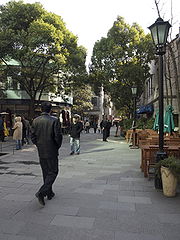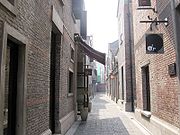
Xintiandi
Encyclopedia

Shanghai
Shanghai is the largest city by population in China and the largest city proper in the world. It is one of the four province-level municipalities in the People's Republic of China, with a total population of over 23 million as of 2010...
, China
China
Chinese civilization may refer to:* China for more general discussion of the country.* Chinese culture* Greater China, the transnational community of ethnic Chinese.* History of China* Sinosphere, the area historically affected by Chinese culture...
. It is composed of an area of reconstituted traditional shikumen
Shikumen
Shikumen , literally "stone gate", is an architectural style for residential buildings in Shanghai, China combining Western and Chinese elements that first appeared in the 1860s...
("stone gate") houses on narrow alleys, some adjoining houses which now serve as book stores, cafes and restaurants, and shopping malls. Most of the cafes and restaurants feature both indoor and outdoor seatings. Xintiandi has an active nightlife on weekdays as well as weekends, though romantic settings are more common than loud music and dance places. It is considered one of the first lifestyle center
Lifestyle center (retail)
A lifestyle center is a shopping center or mixed-used commercial development that combines the traditional retail functions of a shopping mall with leisure amenities oriented towards upscale consumers...
s in China.
Xintiandi is the location of the site of the first congress of and the Communist Party of China
Communist Party of China
The Communist Party of China , also known as the Chinese Communist Party , is the founding and ruling political party of the People's Republic of China...
, now preserved at the Museum of the First National Congress of the Chinese Communist Party
Museum of the First National Congress of the Chinese Communist Party
The Museum of the First National Congress of the Chinese Communist Party is a museum of the city of Shanghai, in the area of Xintiandi, on Xingye Road...
. Also nearby is the site of the Provisional Government of the Republic of Korea
Provisional Government of the Republic of Korea
The Provisional Government of the Republic of Korea was the partially recognised government in exile of Korea, based in Shanghai, China, and later in Chongqing, during the Colonial Korea.-History:...
when Korea was a Japanese colony.

Redevelopment
The area was developed by Shui On LandShui On Land
Shui On Land Limited is the flagship property company of the Hong Kong-based Shui On Group. It is engaged in developing large-scale city-core development projects and integrated residential development projects in major cities in China, including Shanghai, Wuhan, Chongqing, Hangzhou, Dalian and...
during the re-development of the surrounding area. Some houses in Xintiandi were then limited (and not renovated, unlike the Chinese government and the real estate agency official version ), in order to implant an art gallery, cafes, and restaurants. Many tour groups both domestic and from abroad also visit Xintiandi as one of the main attractions in Shanghai.
The Xintiandi redevelopment was designed by Benjamin T. Wood
Benjamin T. Wood
Benjamin T. Wood is an American architect who designed Shanghai's famous Xintiandi, which means “New Heaven and Earth,” a refined cluster of traditionally styled Shanghai brick town houses near the old French Concession district....
and Nikken Sekkei
Nikken Sekkei
is a Japanese architecture firm headquartered in Chiyoda, Tokyo.-External links:*, official site...
International. The urban renewal is considered one of the first examples of the placemaking
Placemaking
Placemaking is a term that began to be used in the 1970s by architects and planners to describe the process of creating squares, plazas, parks, streets and waterfronts that will attract people because they are pleasurable or interesting...
approach in China. )
This construction displaced 3,500 Shanghainese families.

